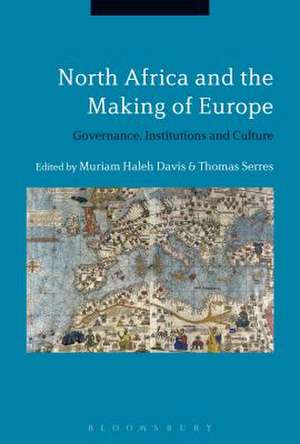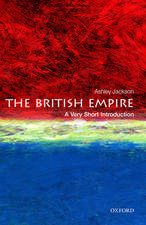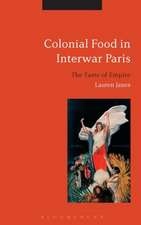North Africa and the Making of Europe: Governance, Institutions and Culture
Editat de Dr Muriam Haleh Davis, Dr Thomas Serresen Limba Engleză Paperback – 21 aug 2019
| Toate formatele și edițiile | Preț | Express |
|---|---|---|
| Paperback (1) | 232.34 lei 6-8 săpt. | |
| Bloomsbury Publishing – 21 aug 2019 | 232.34 lei 6-8 săpt. | |
| Hardback (1) | 716.63 lei 6-8 săpt. | |
| Bloomsbury Publishing – 21 feb 2018 | 716.63 lei 6-8 săpt. |
Preț: 232.34 lei
Preț vechi: 265.87 lei
-13% Nou
Puncte Express: 349
Preț estimativ în valută:
44.46€ • 45.94$ • 36.98£
44.46€ • 45.94$ • 36.98£
Carte tipărită la comandă
Livrare economică 19 martie-02 aprilie
Preluare comenzi: 021 569.72.76
Specificații
ISBN-13: 9781350126527
ISBN-10: 1350126527
Pagini: 304
Ilustrații: 1 b/w illustration
Dimensiuni: 156 x 234 x 21 mm
Greutate: 0.42 kg
Editura: Bloomsbury Publishing
Colecția Bloomsbury Academic
Locul publicării:London, United Kingdom
ISBN-10: 1350126527
Pagini: 304
Ilustrații: 1 b/w illustration
Dimensiuni: 156 x 234 x 21 mm
Greutate: 0.42 kg
Editura: Bloomsbury Publishing
Colecția Bloomsbury Academic
Locul publicării:London, United Kingdom
Caracteristici
Includes contributions from Arabic-, French- and English-speaking academics, bringing together divergent scholarly approaches and bridging linguistic divides
Notă biografică
Muriam Haleh Davis is Assistant Professor of History at the University of California, Santa Cruz, USA. Thomas Serres is Lecturer in Politics at the University of California, Santa Cruz, USA.
Cuprins
Introduction: Europe and North Africa beyond the 'Boomerang Effect', Muriam Haleh Davis and Thomas Serres (both of University of California, Santa Cruz, USA)Part I - Colonialism and Institutions1. The Role of Algeria in Debates over Post-War Europe within the French Resistance, Luc-Andre Brunet (The Open University, UK)2. North Africa and the Common Agricultural Policy: From Colonial Pact to European Integration, Muriam Haleh Davis (University of California, Santa Cruz, USA)3. (Post)Colonial Migrations between States and Companies: Moroccan Workers in Europe, Anton Perdocin (PSC Research University, France)4. North African Decolonization and the Shifting Nexus of Christian Power and Social Thought in Europe and North Africa, Darcie Fontaine (University of South Florida, USA)Part II - Europe Defined: Imaginaries and Practices5. Europe and North Africa in Jacque Berque's Historical Sociology, Timothy Scott Johnston (Texas A&M University-Corpus Christi, USA)6. 'Foreigners in Our Own Land': Importing North African Experiences of Nativism, Gendered Islamophobia and Muslim Activism to Europe, Aitana Guia (California State University, Fullerton, USA)7. Hope and Disillusion: The Representations of Europe in Algerian and Tunisian Cultural Production about Undocumented Migration, Farida Souiah (Sciences Po, France), Monika Salzbrunn (University of Lausanne, Switzerland), and Simon Mastrangelo (University of Lausanne, Switzerland)8. Practices of Imperial Identity: Patterns and Paradoxes in EU Trade and Energy Policies toward the Maghreb Region, Simone Tholens (Cardiff University, UK)Part III - States of Crisis and Exception9. A European Delegation in Algeria: Human Rights and Democracy in the Midst of Civil War, Thomas Serres (University of California, Santa Cruz, USA)10. Conflict and Peace in the Mediterranean Space: Europe's Response to the Libyan Crisis, Irene Costantini (University of Naples "L'Orientale", Italy)11. EU Support for Transitional Justice in the Aftermath of the Arab Spring: What Has Become of the Promises of the Fourth Wave of Transitional Justice? Elise Ketelaars (Ulster University, UK)Conclusion: #Eurostop: Toward a Feminist Decolonial Critical Theory of Europe, Lilith Mahmud (University of California, Irvine, USA)Index
Recenzii
Because North Africa and the Making of Europe is so interdisciplinary, even the most seasoned Maghrebi or European specialists will find themselves pleasantly surprised by the wide range of synergies and syncretisms explored in this text, all of which have become inherently accepted as part of European identity. Most importantly, the text's continuous efforts to reflect a Europe that is not other from North Africa, but is by necessity defined by its proximity and history with the region, is a needed voice in today's environment of growing authoritarianism and nationalism on both sides of the Mediterranean.
Drawing on exciting new scholarship that helpfully broadens the customary focus on the Franco-Algerian dynamic, by including Libya, Morocco, Spain, and Tunisia, this inter-disciplinary volume makes a highly significant contribution to the much-debated questions of how, why and to what extent the colonial past remains present, and how North African and European histories and experiences remain closely intertwined. In so doing, it underlines the central, rather than marginal place that North Africa has occupied in recent history.
The EU's relations with its southern Mediterranean neighbours were troubled long before 2011. Now the European project itself is faltering and under attack from right-wing populism, anti-immigrant nationalism, and nostalgia for a fictitious history of empire. Meanwhile, authoritarianism, economic crisis, civil war and counter-revolution run from Morocco to Libya and Egypt. While a tide of racism sees the EU's crisis in a failure to "defend" Europe from "invasion" across the Mediterranean, this book reminds us that North Africa was always deeply bound up with the making of postwar Europe. And while there are many reasons to criticize Europe's Mediterranean policies, these varied, deeply researched and incisive essays compellingly show, from the late colonial period to the present, that North Africa has always played a role in imagining and reimagining what it might mean to be European.'
Drawing on exciting new scholarship that helpfully broadens the customary focus on the Franco-Algerian dynamic, by including Libya, Morocco, Spain, and Tunisia, this inter-disciplinary volume makes a highly significant contribution to the much-debated questions of how, why and to what extent the colonial past remains present, and how North African and European histories and experiences remain closely intertwined. In so doing, it underlines the central, rather than marginal place that North Africa has occupied in recent history.
The EU's relations with its southern Mediterranean neighbours were troubled long before 2011. Now the European project itself is faltering and under attack from right-wing populism, anti-immigrant nationalism, and nostalgia for a fictitious history of empire. Meanwhile, authoritarianism, economic crisis, civil war and counter-revolution run from Morocco to Libya and Egypt. While a tide of racism sees the EU's crisis in a failure to "defend" Europe from "invasion" across the Mediterranean, this book reminds us that North Africa was always deeply bound up with the making of postwar Europe. And while there are many reasons to criticize Europe's Mediterranean policies, these varied, deeply researched and incisive essays compellingly show, from the late colonial period to the present, that North Africa has always played a role in imagining and reimagining what it might mean to be European.'











